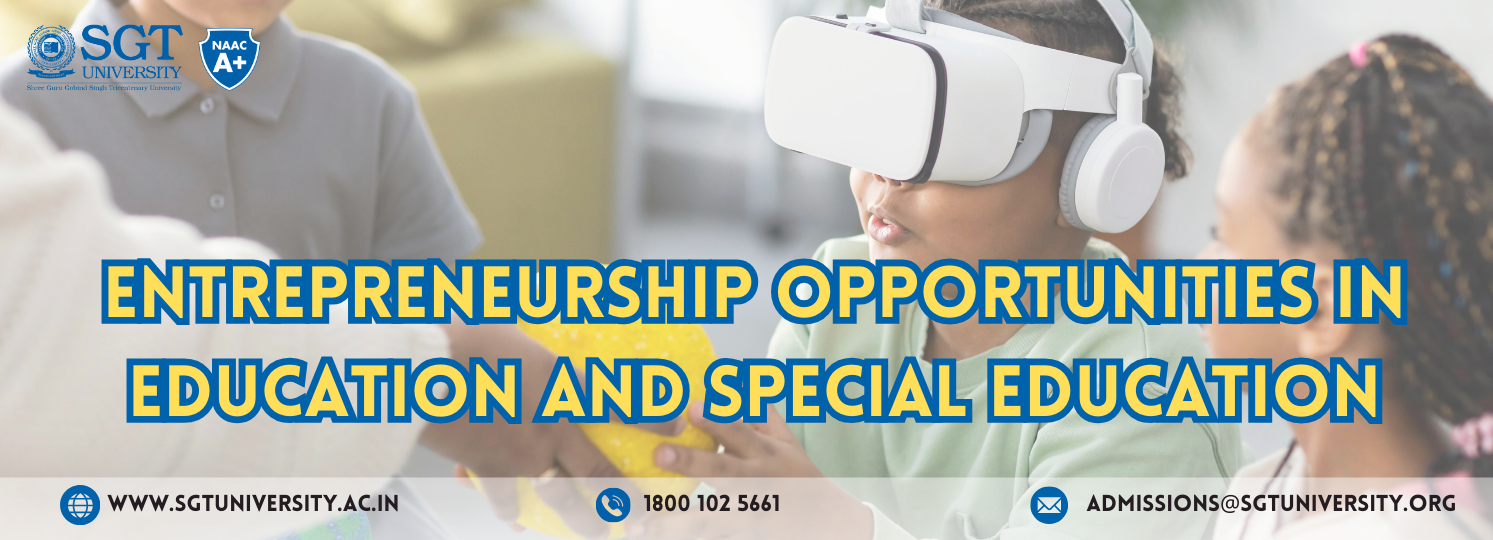Entrepreneurship Opportunities in Education and Special Education
Updated on: August 27, 2024

Explore the burgeoning field of edupreneurship with insights into entrepreneurship opportunities in general and special education. Discover how innovation, technology, and evolving needs are shaping new ventures and solutions in both traditional and special education sectors.
I. Background on Entrepreneurship in Education
Entrepreneurship in education, also known as "edupreneurship," has rapidly evolved over the past two decades, blending business innovation with educational improvement. This sector aims to tackle challenges in both traditional and special education through novel approaches, technologies, and services. The rise of edupreneurship is driven by several factors:
- Economic Development: Increasing recognition of education's role in economic growth.
- Personalized Learning: Growing demand for tailored and effective learning solutions.
- Technological Advancements: Innovations opening new avenues for educational delivery and engagement.
Historically dominated by public institutions and established private organizations, the education sector has seen a shift towards innovative models. Entrepreneurs now range from tech developers creating educational apps to educators launching alternative schools and specialized services.
II. Importance of Innovation in Education and Special Education
1. Addressing Evolving Workforce Needs
Education must adapt to prepare students for future careers that may not yet exist, reflecting the rapid changes in the global economy.
2. Improving Learning Outcomes
Traditional one-size-fits-all approaches are becoming inadequate. Innovation allows for more personalized, engaging, and effective learning experiences.
3. Increasing Accessibility
Innovative methods can extend quality education to underserved populations, including remote areas and those with special needs.
4. Enhancing Efficiency
New technologies and methodologies streamline administrative tasks, enabling educators to focus more on teaching.
In special education, innovation is crucial. It includes assistive technologies that aid communication and specialized curricula that address diverse learning styles, significantly improving the quality of life for students with disabilities.
III. Current Landscape of Education Entrepreneurship
A. Overview of the Education Industry
The global education industry is a vast ecosystem, spanning from early childhood education to higher education and professional development. Valued at approximately $5.5 trillion in 2020, it is projected to reach $10 trillion by 2030, reflecting a CAGR of about 4.3% (Global Industry Analysts, 2021).
Key segments include:
- K-12 Education
- Higher Education
- Corporate Training and Workforce Development
- Language Learning and Test Preparation
- Early Childhood Education
- Special Education and Disability Services
The industry is increasingly privatized and commercialized, creating numerous opportunities for entrepreneurs.
B. Recent Trends in Educational Startups
The education startup ecosystem is evolving, with several notable trends:
- Personalized Learning Platforms: Utilizing AI and machine learning to create adaptive learning systems.
- Microlearning and Skills-Based Education: Focus on bite-sized, targeted learning experiences.
- Mobile-First Education Solutions: Development of mobile apps for learning on the go.
- Gamification in Education: Incorporating game elements to boost engagement.
- Virtual and Augmented Reality: Creating immersive learning experiences.
- Online Tutoring and Mentorship: Connecting students with global educators.
- Education Marketplaces: Platforms connecting learners with diverse courses and resources.
C. Impact of Technology on Educational Entrepreneurship
Technology drives innovation in education, transforming delivery, consumption, and management:
- Scalability: Digital platforms enable global reach.
- Data-Driven Insights: Advanced analytics inform continuous product improvement.
- Democratization of Education: Online platforms make high-quality content accessible worldwide.
- Personalization at Scale: AI provides individualized experiences for large student groups.
- Improved Engagement: Interactive content enhances student retention.
- Efficiency in Administration: Streamlining administrative tasks.
- New Business Models: Innovations include subscription-based and freemium models.
Technology has opened new opportunities for entrepreneurs and necessitated the evolution of traditional educational practices.
IV. Opportunities in General Education
The general education sector offers numerous entrepreneurial opportunities driven by technological advancements and evolving needs.
A. Educational Technology (EdTech)
- Learning Management Systems (LMS): Platforms for course management and delivery, like Canvas and Blackboard.
- Adaptive Learning Platforms: AI-driven systems personalizing learning paths (e.g., Knewton, DreamBox Learning).
- Virtual and Augmented Reality: Technologies creating immersive learning experiences (e.g., Nearpod, Labster).
B. Supplementary Education Services
- Tutoring and Test Preparation: Online platforms like VIPKid and Chegg.
- After-School Programs: Innovative programs blending education with entertainment (e.g., Code.org).
- Summer Camps and Workshops: Specialized programs in areas like coding and language immersion.
C. Curriculum Development and Content Creation
Opportunities include:
- Interactive E-Textbooks and Multimedia Resources
- Subject-Specific Mobile Apps and Games
- Educational Videos and Podcasts
D. Teacher Training and Professional Development
Opportunities for continuous teacher training include:
- Online Professional Development Courses
- Platforms for Teacher Collaboration
- Classroom Management Tools
V. Opportunities in Special Education
The special education sector presents unique challenges and opportunities:
A. Assistive Technologies
- Communication Devices: Innovative tools for non-verbal students (e.g., Tobii Dynavox, Proloquo2Go).
- Mobility Aids: Smart wheelchairs and exoskeletons.
- Adaptive Learning Tools: Tools for making curricula accessible to various disabilities.
B. Specialized Curriculum and Content
Opportunities include:
- Multi-Sensory Learning Materials for Dyslexia
- Social Skills Curricula for Autism
- Life Skills Programs for Intellectual Disabilities
C. Therapy and Intervention Services
Opportunities include:
- Teletherapy Platforms for Various Therapies
- AI-Powered Early Intervention Tools
- Virtual Reality for Social Skills Training
D. Inclusive Education Consulting
Opportunities for consultants include:
- Training Programs for Inclusive Practices
- Tools for Effective IEP Development
- Consulting for Universally Accessible Learning Spaces
Entrepreneurs in special education can develop scalable solutions to help schools implement best practices in inclusive education efficiently.
Ms. Priyanka Yadav
Assistant Professor
Department of Special Education
Faculty of Education
SGT University, Gurugram

